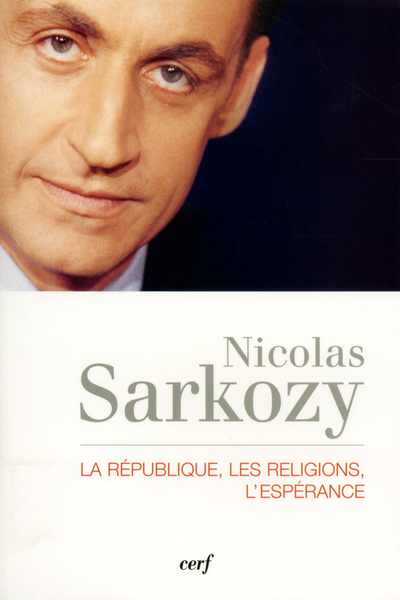- EAN13
- 9782204072830
- Éditeur
- Cerf
- Date de publication
- 28 octobre 2004
- Collection
- L'histoire à vif
- Nombre de pages
- 172
- Dimensions
- 21,5 x 14,5 x 1,4 cm
- Poids
- 230 g
- Langue
- fre
Les République, Les Religions, L'Espérance, Entretiens Avec Thibaud Collin Et Philippe Verdin
Nicolas Sarkozy, Philippe Verdin, Thibaud Collin
Cerf
Prix public : 22,00 €
Avec ce livre, Nicolas Sarkozy affronte l'un des tabous de la société française : la place des religions dans la République. Il aborde sans complexes le défi de l'islam comme religion en France, la construction des mosquées, le foulard à l'école et dans l'administration, le radicalisme de certains imams, l'élan religieux des jeunes générations, la formation des prêtres, les relations avec le Vatican, l'anticléricalisme, le contrôle des sectes, l'enseignement du fait religieux, les violences racistes qui prennent pour prétexte des appartenances religieuses... Sur toutes ces questions, Nicolas Sarkozy s'engage. Il souhaite inventer une laïcité ouverte et apaisée, où chacun, quels que soient sa foi ou ses doutes, puisse vivre son espérance et participer à la construction de la société démocratique. Dans la liberté de la conversation, le lecteur découvre un homme qui parle de la République, de la foi, de ses rencontres avec des figures spirituelles qui l'ont marqué, des convictions qu'il veut transmettre à ses enfants. L'autorité de l'auteur et l'urgence des thèmes abordés font de cet ouvrage une contribution majeure à la réflexion sur les valeurs fondatrices de la République et l'avenir de la laïcité française. -- With this book, Nicolas Sarkozy confronts one of French society's taboos: the place given to religion within the Republic. Without beating about the bush, he discusses the challenge of Islam in France, the construction of Mosques, wearing the hijab in French schools and administrations, the radicalism of certain imams, the religious fervour of the younger generations of Muslims, the vocation of priests, relations with the Vatican, anticlericalism, keeping sects under control, teaching religion, racial violence that finds a pretext in religious identity...so many problems that cause concern not only in France, but in many other European countries On all of these questions, Nicolas Sarkozy takes a clear stand. His aim is to create a secular society that is open and serene, where each citizen, whatever their hopes or fears, can live, hope and participate in the construction of democracy. In this candid and relaxed conversation, the reader discovers a man who talks about the Republic, faith, his meetings with spiritual leaders who have made an impression on him, the convictions he would like to pass on to his children. The authority of the author and the urgency of the themes treated make this book a major contribution to reflection on the founding values of the Republic, and the future of secular society in France.


















